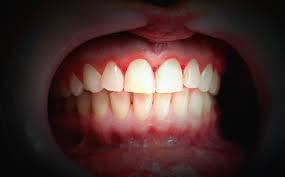Gingivitis is an infection of your gums, but it's not always painful and therefore may not give you any warning. With this in mind, if you don't start some type of gingivitis treatment, you could end up losing your teeth. Gingivitis affects one out of every five people. And one of those five could be you.
You will learn why you get gingivitis, how to prevent it, and how to treat it, in this article. Before you start losing any teeth, read on now.
- If you notice your gums are swollen, have turned a red or purple color, are bleeding, or just feel sore - and you have a breath that could kill at two mile's distance, you should see a dentist near me. Any, or all, of these gingivitis symptoms, could be a warning sign of inflammation of the gums.
- Other factors, such as being pregnant or using specific medicine, can also cause inflammation of the gums. Other causes may include a virus, bacteria, genetic issues, or lesions.
- The most common causes for inflammation of the gums are plaque and residues left on your teeth. Plaque occurs naturally when you eat, so you should brush your teeth properly at least twice a day to remove it. This single action, by the way, will do wonders for your breath.
- However, some of the plaque sticks firmer to the teeth than is normal. That part is called tartar, and it consists of an incrustation called calculus. You cannot remove this yourself, since it demands special treatment that only a dentist can deliver.

How to get rid of gingivitis?
- While you cannot prevent this type of gingivitis, you can readily treat it with the aid of your dentist.
- They recommend brushing and flossing at least twice a day unless you are prone to gingivitis gums, in which case you should brush and floss after every meal and also before going to bed.
- However, a good-quality electric toothbrush can prevent much of the tartar from building up.
How to treat gingivitis?
-This type of gingivitis can be treated by brushing your teeth thoroughly since you have to completely remove the plaque from your teeth.
-To remove any bacteria, you should wash your mouth with either hydrogen peroxide or a solution containing chlorhexidine, together with flossing.
-If you prefer natural remedies, mouth washing with essential oils, combined with effective teeth brushing, has shown good results.
-In order for a gingivitis treatment to be effective, you must brush your teeth the correct way. Make sure that every tooth is thoroughly cleaned (including the biting surfaces) and also brush the gums as well.
-Don't rush just by letting the toothbrush simply fly over your teeth. Take your time and be thorough. Hold the toothbrush still long enough on each tooth to make sure that it's totally clean. Arise five minutes earlier every morning to ensure that you have the necessary time to take care of your dental hygiene.
Remember: Gum inflammation may not only be a painful condition, it could also be a disease that ends up costing you teeth or even infection of the jawbones. It's certainly not a condition to be taken lightly, so do something now - the sooner the better.
Article Source : - https://jeffreylinda.blogspot.com/2021/07/how-to-cure-gingivitis.html





Comments